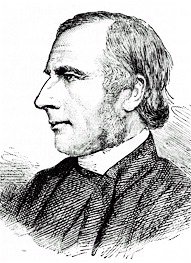Introduction

Born: August 6, 1821, London, England.
Died: February 1, 1891, the Deanery, Wells, England.
Buried: Wells Cathedral, England.


Born: August 6, 1821, London, England.
Died: February 1, 1891, the Deanery, Wells, England.
Buried: Wells Cathedral, England.

Edward was the husband of Harriet Theodosia Maurice.
He was educated at King’s College, London, and University College, Oxford, graduating as a double first in 1844. He was for some time Fellow of Brasenose College, Oxford.
On taking Holy Orders in 1846, he rapidly reached a foremost position as theologian and preacher.
His appointments included assistant preacher at Lincoln’s Inn; select preacher at Oxford; Professor of Pastoral Theology at King’s College, Cambridge; prebendary in St. Paul’s Cathedral, London; Professor of Exegesis of the New Testament, King’s College, London; Boyle Lecturer; Grinfield Lecturer on the Septuagint, Oxford; and dean of Wells Cathedral (1881–91).
The princely David, with his outlaw-band,
Lodged in the cave Adullam. Wild and fierce,
With lion-like faces, and with eagle eyes,
They followed where he led. The danger pressed,
For over all the land the Philistines
Had spread their armies. Through Rephaim’s vale
Their dark tents mustered thick, and David’s home,
His father’s city, Bethlehem, owned them lords.
’Twas harvest, and the crops of ripening corn
They ravaged, and with rude feet trampled down
The tender vines. Men hid themselves for fear
In woods or caves. The braved undaunted few,
Gathering round David, sought the mountain hold.
The sun was hot, and all day long they watched
With spear in hand and never-resting eye,
As those who wait for battle; but at eve
The eye grew dim, the lips were parched with thirst,
And from that arid rock no trickling stream
Of living water gushed. From time-worn skins
The tainted drops were poured, and fevered lips
Half-loathing drank them up. And David’s soul
Was weary; the hot simoom scorched his veins;
The strong sun smote on him, and, faint and sick,
He sat beneath the shadow of the rock;
And then before his eyes a vision came.
Cool evening, meadows green, and pleasant sounds
Of murmuring fountains. Oft in days of youth,
When leading home his flocks as sunset fell,
That fount had quenched his thirst, and dark-eyed girls,
The pride and joy of Bethlehem, meeting there,
Greeted the shepherd boy, their chieftain’s son,
(As, bright and fair with waving locks of gold,
Exulting in the flush of youth’s full glow,
He mingled with their throng), and gazing, rapt
With wonder at his beauty, gave him drink.
And now the words came feebly from his lips,
A murmur half in silence, which the ear
Of faithful followers caught: Ah! who will bring
They heard, the three,
From that fair stream, which flowing by the gate
Of Bethlehem’s wall makes music in the ear,
One drop to cool this tongue?
The mightiest of the thirty, swift of foot
As are the harts upon the mountains, strong
As are the lions down by Jordan’s banks;
They heard and darted forth; down rock and crag
They leapt, as leaps the torrent on its course;
Through plain and vale they sped and never stayed,
Until the wide encampment of the foe
Warned them of danger nigh. But not for fear
Abandoned they their task. When evening fell,
And all the Philistines were hushed in sleep,
And over all the plain the full, bright moon
Poured its rich luster, onward still they stole,
By tent fires creeping with hushed breath, and feet
That feared to wake the echoes, till at last
They heard the babbling music, and the gleam
Of rippling moonlight caught their eager eye,
And o’er them fell the shade of Bethlehem’s gate.
They tarried not. One full delicious draught
Slaked their fierce thirst, and then with anxious haste
They filled their water-urn, and full of joy,
They bore it back in triumph to their lord.
Which quickened steps they tracked their path again
O’er plain and valley, up o’er rock and crag,
As th early sunlight kissed the hills
They stood before him.
He had won their hearts by brave deeds,
And gentle words, stainless life;
And now they came to give him proof of love,
And pouring out the water bade him drink.
But lo! he would not taste. He heard their tale
(In few words told, as brave men tell their deeds),
And lifting up his hands with solemn prayer,
As though he stood, a priest, before the shrine,
He poured it on the earth before the Lord.
Far be it from me, God, that I should drink,
The slave of selfish lust, forgetting Thee,
Forgetting these my brothers. In Thine eyes
This water fresh and cool is as the blood
Of hero-souls who jeopardied their lives:
That blood I may not taste. As shrink the lips
From the hot lit-stream of the Paschal Lamb,
So shrinks my soul from this. To Thee, O Lord,
To Thee I pour it. Thou wilt pardon me
For mine unkingly weakness, pardon them
For all rough deeds of war. Their noble love
Shall over all their sins; for Thou hast claimed,
More than all the blood of bulls and goats, the will
That, self-forgetting, lives in deeds like this.
So spake the hero-king, and all the host
Looked on and wondered; and those noble three,
The mightiest of the thirty, felt their souls
Knit closer to King David and to God.
Edward Hayes Plumptre
Lazarus, and Other Poems, 1864